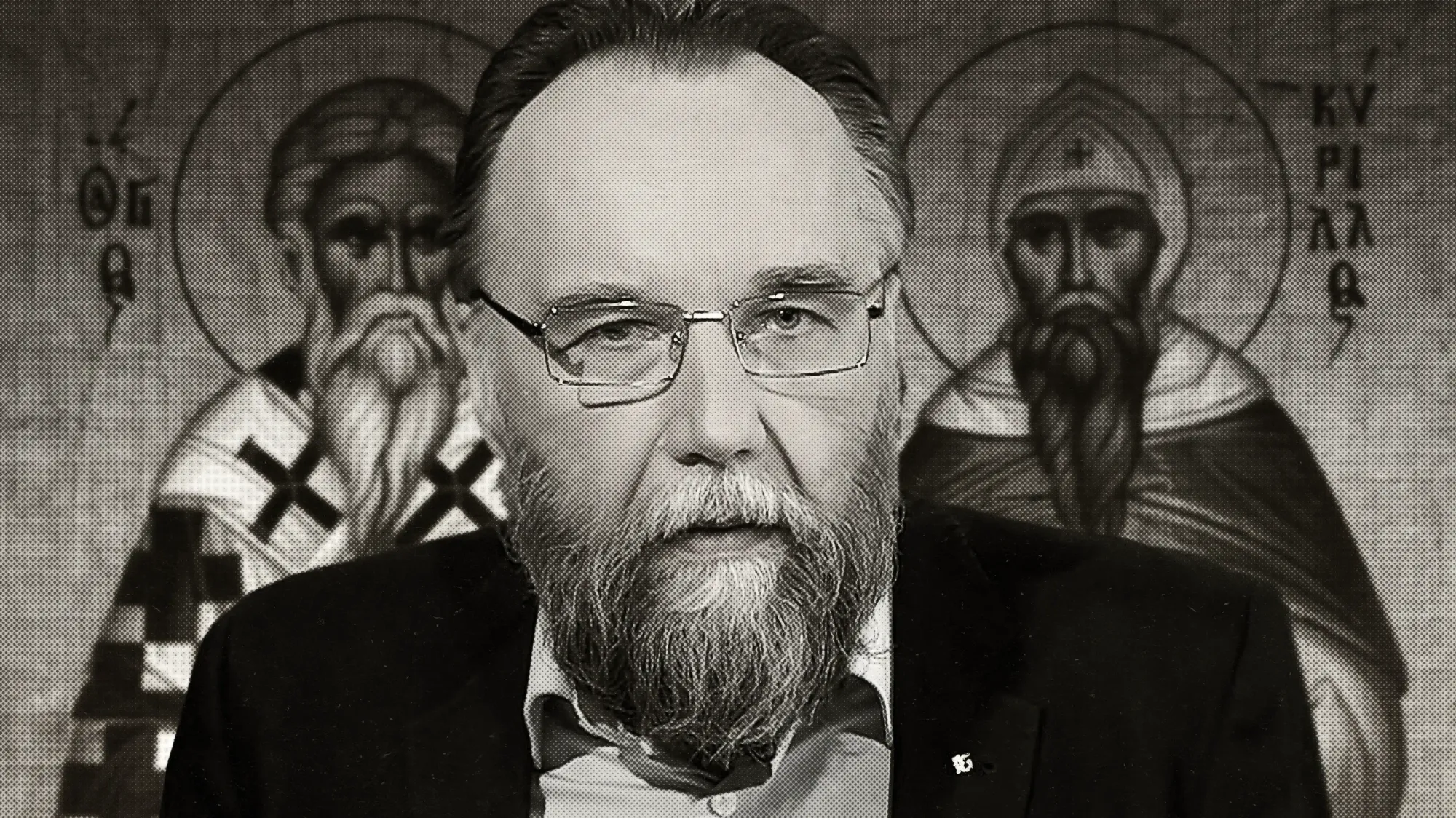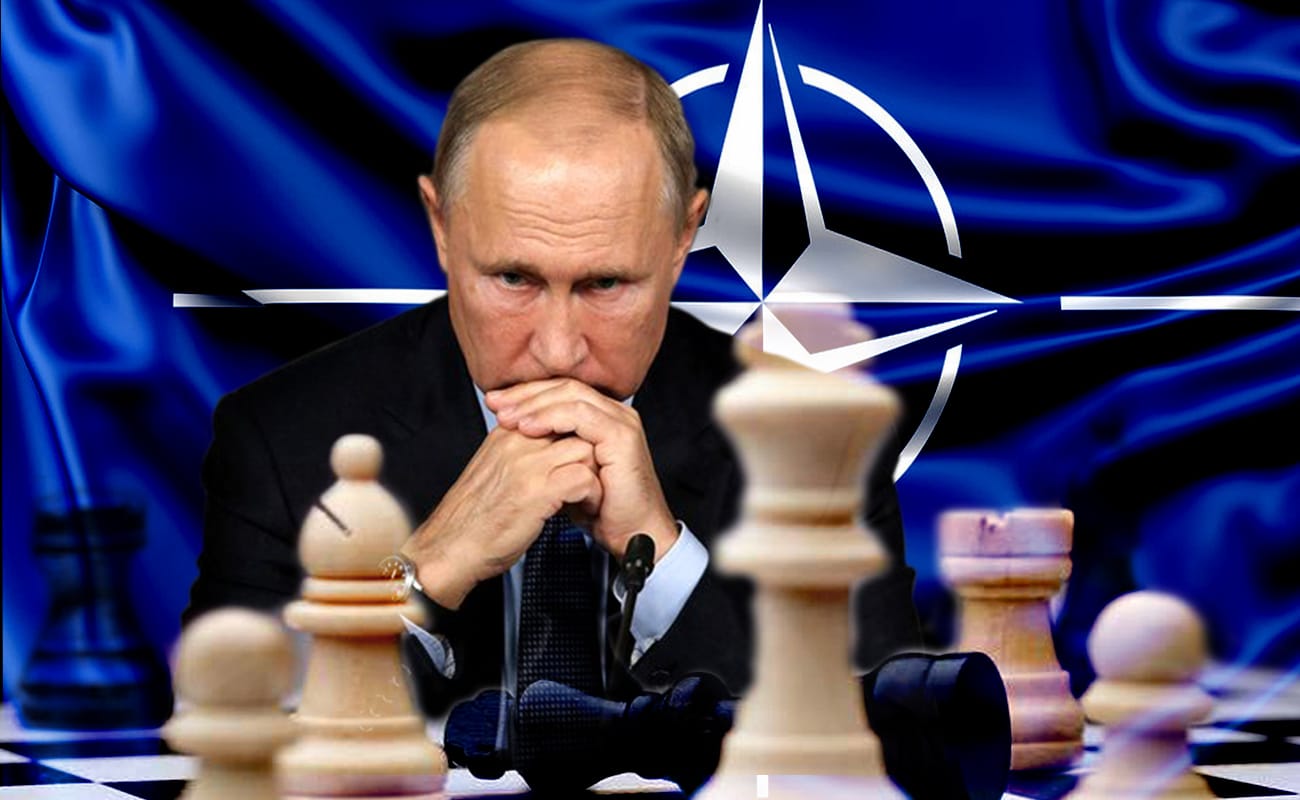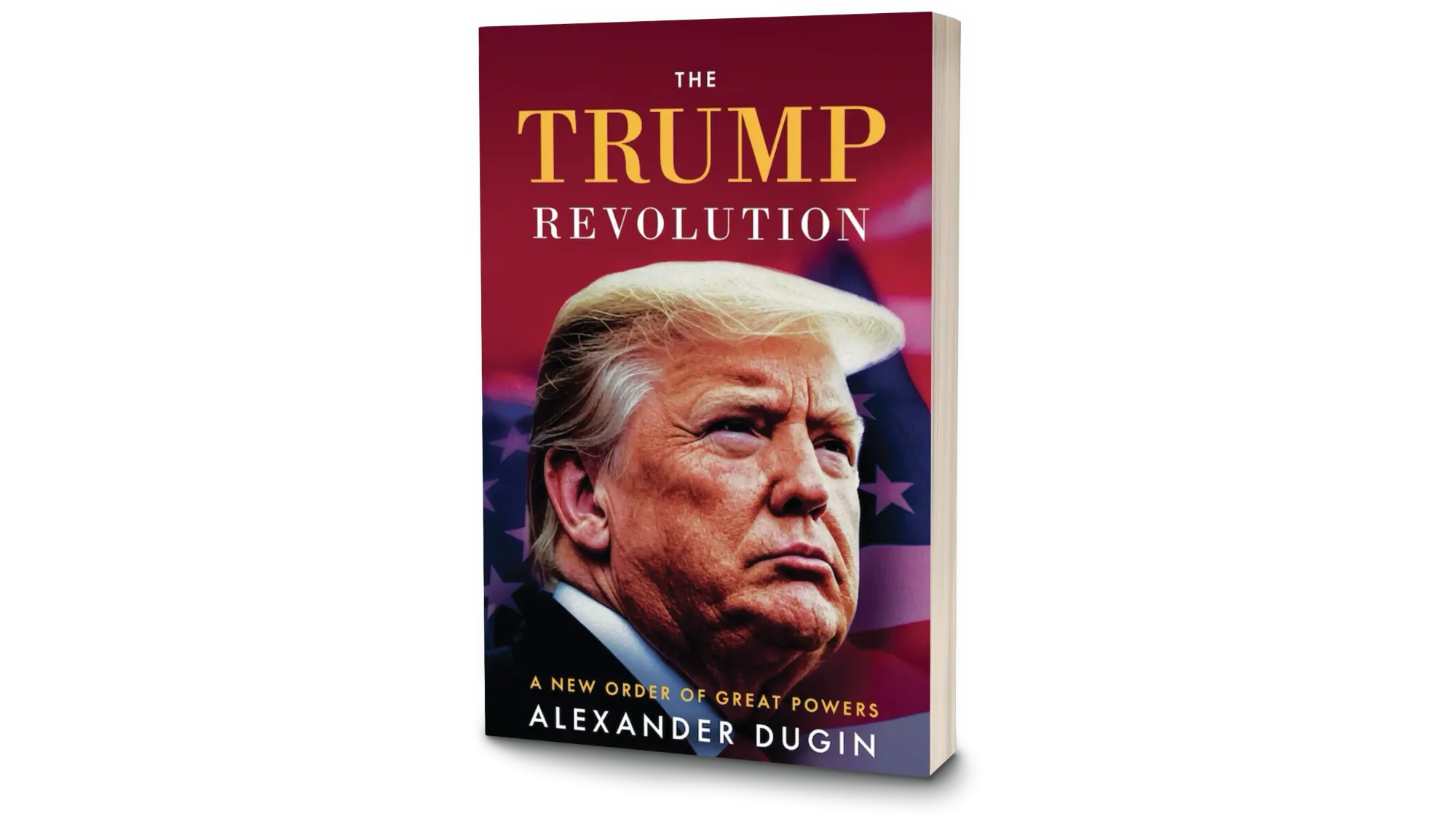Aleksandr Dugin, Vladimir Putin, and Donald Trump

A review of The Trump Revolution: A New Order of Great Powers by Aleksandr Dugin, Arktos Media, 2025, 136 pages.
Aleksandr Dugin has been described as the Kremlin’s chief ideologue for his substantial influence on Russian politics, promoting nationalist and traditionalist themes and publishing extensively on Russia’s central role in world civilization. He is also a long-time supporter of Donald Trump, and in his new book, The Trump Revolution: A New Order of Great Powers, Dugin celebrates the election of America’s 47th president as the culmination of his life’s work.
In an earlier article in Skeptic, I called Dugin “a mystical high priest of Russian fascism who wants to bring about the end of the world,” but also noted that is he is a philosopher who specializes in the study and use of ideologies. In the 1990s, Dugin set himself the task of synthesizing a new ideology to replace the defunct communist movement as the foundation for the Kremlin’s international fifth column. For a while he played with the idea of uniting all antiliberal ideologies, including socialism, fascism, and ecologism, into a single allegedly profound “fourth political theory.”
Ultimately, however, Dugin was drawn toward the Third Reich’s National Socialism, which he found to be admirable. Dugin came to realize that the essence of Nazism was not its historical particulars, but Hitler’s key political insight, namely that there is no contradiction between nationalism and socialism. On the contrary, it is only by invoking the tribal instinct that a leader can arouse the passion needed to realize the full collectivist program, whose top priority is not the collectivization of property, but the eradication of individual reason and conscience through the collectivization of minds.
As Dugin saw it, every country could have its own tribal-collectivist movement. He thus proceeded on this principle to organize an “Alt-Right” Comintern with parties in nearly every Western nation all based on the same template, combining militant national chauvinism, most often mobilized around anti-immigrant sentiment with fealty to the Kremlin. Participating units in this franchise include the French National Rally led by Marine Le Pen, the German Alternative für Deutschland (AfD), the followers of Nigel Farage in the UK, Victor Orbán’s party in Hungary, and similar parties in the Netherlands, Austria, Italy, Slovakia, and many other European countries. In The Trump Revolution, Dugin welcomes what he sees as the triumph of its American branch.

Arktos Media, the publisher of Dugin and a long list of other ultra-nationalist writers, derives its name from the Thule Society, which was devoted to the historical and anthropological search for the origin of the superior Germanic race, and which provided much of the mystical antecedents for the Nazi movement (the society’s logo adopted the Sanskrit symbol for “good fortune”—a hooked cross called the svastika). Accordingly, Arktos Editor in Chief Constantin von Hoffmeister provides the book’s preface by trumpeting its message in suitably Wagnerian terms—“the world ended.”
It ended in a neon blizzard, and electric storm of shattered paradigms. … We have Trumpism 2.0, and it is a revolution beyond revolutions–a final reckoning that promises to devour the remains of the corrupted system and rebuild something ancient, something powerful, something terrifying in its purity. … The Globalist Cathedral is in ruins. The Swamp has been burned, and from its ashes rises something ancient, something terrible, something divine. This is the Trumpian Ragnarök. This is history breaking apart and reassembling itself in a new form. Welcome to the Renewed World Order. It is not for the weak.
Dugin takes up the mantle from there:
Trumpism has emerged as a unique phenomenon, combining the long-marginalized national-populist agenda of paleoconservatives with an unexpected shift in Silicon Valley, where influential high-tech tycoons have begun aligning with conservative politics. … Thus, Trump’s second term has become the final chord in the geopolitics of a multipolar world, marking the overturning of the entire liberal-globalist ideology.
Dugin’s war is against the West, considered both as a creed whose Enlightenment liberal humanism threatens the principle of the need for unlimited tyranny (in Russian the “Silnaya Ruka,” or strong arm) underpinning Kremlin rule, and as a concrete geostrategic military power that must be defeated to expand Russian global dominion. He celebrates the election of Trump as serving both of those purposes:
This “illiberal nationalism” has become the ideological axis of the MAGA (Make America Great Again) movement. The United States is no longer presented as the global distributor of liberal democracy and its guarantor on a planetary scale. Instead, it is redefined as a Great Power–focused on its own greatness, sovereignty, and prosperity.
Thus, under Trump, there is no reason for the U.S. to maintain its alliances with other liberal democracies, supporting the system of collective security of the free world superpower, or what Dugin decries as the “unipolar world.” Instead, the U.S. can become, alongside Russia and China, one of several predatory Great Powers dominating continental spheres of influence within a new “multipolar world.”
Call it political transactionalism or moral nihilism if you prefer. I think evil hits the nail right on the head.
There is on offer here something akin to the Molotov–Ribbentrop Pact, under which the United States gets North America, China gets east Asia and south Asia, and Russia gets Eurasia, “from Lisbon to Vladivostok.” It takes little imagination to see why such a division of spoils might appeal to the political leaders of Russia. But the fruition of such a great-power realignment very much depends upon the Americans abandoning their role as crusaders for the cause of world freedom. Fortunately, says Dugin, Trump is on board with this new alignment:
Trump and his ideology categorically reject any notion of internationalism, and rhetoric about so-called “universal human values,” “world democracy,” or “human rights.” Instead Trump appears to envision a final rupture with both the Yalta system and the unipolar globalist movement. He has therefore set out to dismantle all international institutions that symbolize the past eighty years–the UN, globalist structures like the WHO and USAID, and even NATO. Trump sees the United States as a new empire, and himself as a modern Augustus, who formally ended the decaying Republic. His ambitions extend beyond America itself–hence his interest in acquiring Greenland, Canada, the Panama Canal, and even Mexico. [italics in original]
Dugin’s ideas may appear to be quite mad, but they are actually instructive in revealing possible motivations for the actions of the Trump administration during its opening months. For example, abolishing USAID was justified by the Trump administration as a fiscal responsibility measure, but Dugin contends that entirely other motivations were operational:
The liquidation of the United States Agency for International Development (USAID) is an event whose significance can hardly be overstated. When the Soviet Union abolished the Comintern … structures that advocated the ideological interests of the USSR on a global scale, it marked the beginning of the end for the international Soviet system. … Something similar is happening in America, as USAID was the main operational structure for the implementation of globalist projects. Essentially, it was the primary transmission belt for globalism as an ideology aimed at the worldwide imposition of liberal democracy, market economics, and human rights.
The banning of USAID is a critical, fundamental move, the importance of which, as I said, cannot be overstated. This is especially true because countries like Ukraine largely depend on the agency, receiving significant funding through it. All Ukrainian media, NGOs, and ideological structures were financed by USAID. The same applied to almost the entire liberal opposition in the post-Soviet space, as well as liberal regimes in various countries, including Maia Sandu’s Moldovan administration and many European political regimes, which were also on USAID’s payroll.
Dugin presents Ukraine as central to Russia’s strategic objectives within the envisioned multipolar world order, framing it as a pivotal asset in the redistribution of global influence:
Zelensky undoubtedly realizes that his time is running out, and with it the history of Ukraine comes to an end. … The current U.S. leadership does not intend to continue this policy of support, and therefore Zelensky finds himself in a dead-end situation. His desperate attempts to intervene in the situation resemble a frog trying to climb out of a bucket of milk. He seeks to draw attention to himself despite the fact that no one is asking him, and no negotiations are being conducted with him. The main discussions will be centered on the strategic dialogue between Putin and Trump, concerning not only Ukraine but also the global order. … This is the essence of building a multipolar world, in which Ukraine has no place.

A U.S. disengagement from Ukraine would precipitate a broader decline of European stability, triggering a wider unraveling of the continent’s geopolitical coherence and power:
Handing over a half-decayed, toxic corpse, exuding radiation and stench, is hardly a worthy gift for one’s allies and friends. In this context, Ukraine appears to be just such a toxic waste. Trump is seemingly eager to rid himself of this burden. If Europe is left to face Russia alone, the collapse of the globalist liberal elite will accelerate. Thus, the Trojan gift–the assignment of responsibility to Europe for waging war against Russia in Ukraine–is presumably Trump’s strategy to quickly weaken, and possibly even dismantle his trade competitors while undermining his ideological opponents in Europe. The European elite openly opposes Trumpism.
For example, when Trump suggested the annexation of Greenland, Denmark responded by declaring its willingness to fight. Simply astonishing! Add this to Ukraine, with its decaying society and a frenzied population driven to a state of subhuman aggression–filled with rage towards everyone, clamoring for more money and weapons–this terrorist entity reveals the clear reality that the responsibility for this conflict will fall squarely on the shoulders of the European Union.
If the EU assumes responsibility for Ukraine, it will become the most effective way for Trump to rid himself of a toxic asset that shackles him and places him at a disadvantage in the ongoing redrawing of the geopolitical map. While this will not lead to Europe’s greatness, it will instead hasten its disintegration.
In this vision, Europe is probably gone, although Dugin does admit the outside possibility that during the process of the dissolution of NATO and the EU the German revanchist AfD might be able to step up and Make Europe Great Again. One can readily conceive of how such an eventuality might not work out so well for Russia, but Dugin seems unconcerned.
Dugin—not unlike Trump—does not seem to believe that there is any reality to the concepts of right and wrong. Rather, they only believe in advantage and disadvantage.
There is one fly in the ointment of Dugin’s brave new multipolar world of predatory great powers feasting on the weak. That is Israel. For some irrational reason, says Dugin, Trump “takes a staunchly pro-Israel stance.” What does this mean for Dugin’s multi-polar world order?
I believe Trump is making his first major geopolitical miscalculation in shaping the new world order in the Middle East. He is alienating the Islamic world–a powerful force that he fails to recognize as an independent geopolitical pole. This is especially true regarding his antagonism towards Iran and the Shiite factions that maintain staunchly anti-Zionist and anti-Israel positions. … I hope that, despite his radical rhetoric and actions, once he fully assumes a role as a key global political architect, he will begin to take reality into account. Otherwise he risks ending up like the liberals he ousted.
Dugin freely mixes current Kremlin propaganda lines into his analysis. For example, in line with Putin’s effort to portray Russia’s “special military operation” in Ukraine as a replay of the Soviets’ Great Patriotic War of resistance against Hitler (known as the Second World War to the rest of us), Dugin denounces the Ukrainians as Nazis. It is not only untrue, but hypocritical because in the past Dugin has repeatedly stated his affinity not only for the Waffen SS, but for the work of foundational Nazi intellectuals, including Hitlers’ geopolitical mentor Professor General Karl Haushofer, philosopher Martin Heidegger, and legal theorist Carl Schmitt. Indeed, it is Schmitt’s argument that the idea of fundamental human rights is an intolerable restraint on the Will of the People as expressed through its Leader that is at the core of Dugin’s case against liberalism.
Perhaps to make himself more appealing to some elements of Trump’s political base, Dugin goes out of his way in his book to represent himself as a Christian, and to describe his cause as the defense of “White Christian civilization.” This is quite remarkable, not only because of the identification of Christianity with the interests of a particular race, but because in the past Dugin had openly celebrated Nazi paganism, going so far as to sponsor an artistic cult devoted to its promotion. Indeed, the anti-Christian nature of Dugin’s mystical theology is so rabid that in 2014 Lutheran bishop James Heiser wrote an entire book diagnosing it as systemically evil.

I am not a theist, so some of Heiser’s arguments pass me by. Yet I think that in a fundamental sense he is onto something. Dugin—not unlike Trump—does not seem to believe that there is any reality to the concepts of right and wrong. Rather, they only believe in advantage and disadvantage. On the basis of this “transactionalist” belief structure, Dugin believes the Trump administration is leaning towards abandoning America’s role as “the watchmen on the walls of world freedom,” an outcome that Dugin has devoted his life to obtain. (“We are the watchmen on the walls of world freedom,” is a famous line from the speech that President John F. Kennedy intended to give at the Dallas Trade Mart on November 22, 1963, but he was gunned down before by Lee Harvy Oswald, an ex-Marine who had defected to the Soviet Union.)
Yet it is precisely the collective security arrangements and international system of free trade underlying what Dugin decries as the “unipolar world” that have prevented a general war or a depression since 1945. This unprecedented 80 year-long period of peace, prosperity, and progress has showered enormous blessings not only on America and Europe, but most emphatically Russia as well. Over the course of the final four decades of the “multipolar world” that preceded the establishment of the Pax Americana, Russia was defeated or devastated by war no less than five times. Between the Russo-Japanese War, World War I, the Russian Civil War, the Russo-Polish War, and World War II, well over fifty million Russians were violently sent to their graves. Horrors on that scale ended in 1945. Yet that is the world that Dugin ardently seeks to recreate.
Call it political transactionalism or moral nihilism if you prefer. I think evil hits the nail right on the head.